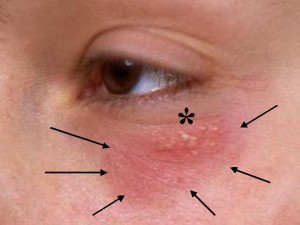What Ocular Herpes is About
October 1, 2010 by Joanna
Filed under Genital Herpes Resource
Ocular herpes, herpes that affects the eye, is usually caused by the same virus responsible for cold sores on the lip, herpes simplex virus type 1. This type of herpes simplex virus can cause inflammation and scarring of the cornea that sometimes is referred to as a cold sore on the eye. Ocular herpes, which usually affects one eye, is not a sexually transmitted disease. It’s spread by contact with people who have the virus. Herpes of the eye or ocular herpes can be transmitted through close contact with an infected person whose herpes virus is active.
Previous studies show that once people develop ocular herpes, they have up to a 50 percent chance of having a recurrence. This second flare-up could come weeks or even years after the initial occurrence of ocular herpes. The Although ocular Herpes is listed as a “rare disease” by the Office of Rare Diseases (ORD) of the National Institutes of Health (NIH), meaning that Ocular Herpes, or a subtype of Ocular Herpes, affects less than 200,000 people in the US population the National Eye Institute (NEI) an estimated 400,000 Americans have experienced some form of ocular herpes or eye herpes, with close to 50,000 new and recurring cases occurring each year.
Forms of Eye Herpes or Ocular Herpes
Ranging from a simple infection to a condition that can possibly cause blindness, there are several forms of ocular herpes or eye herpes:
1st type of Ocular Herpes or Eye Herpes: Herpes keratitis is the most common form of eye herpes and is a viral corneal infection. Ocular herpes in this form generally affects only the top layer, or the epithelium, of the cornea, and usually heals without scarring.
2nd type of Ocular Herpes or Eye Herpes: Stromal keratitis occurs when the herpes infection goes deeper into the layers of the cornea. This can lead to scarring, loss of vision and, occasionally, blindness. Stromal keratitis is a type of ocular herpes that is thought to be caused by a late immune response to the original herpes infection. Although the condition is rare, the NEI reports that stromal keratitis is the leading cause of corneal scarring that subsequently causes blindness in the United States.
 Stromal keratitis occurs when the herpes virus penetrates deeper into the layers of the cornea. Around 25 percent of people with ocular herpes develop this complication, the Massachusetts Eye and Ear Infirmary of Harvard University states.
Stromal keratitis occurs when the herpes virus penetrates deeper into the layers of the cornea. Around 25 percent of people with ocular herpes develop this complication, the Massachusetts Eye and Ear Infirmary of Harvard University states.
An immune reaction occurs to the herpes virus that attacks the cornea causing scarring; this complication is the most common infectious cause of blindness related to the cornea. Steroid drops may help reduce inflammation, but severe scarring may lead to a need for corneal transplantation.
3rd type of Ocular Herpes or Eye Herpes: The third type of ocular herpes is iridocyclitis. Iridocyclitis is a serious form of eye herpes where the iris and surrounding tissues inside the eye become inflamed, causing severe sensitivity to light, blurred vision, pain and redness. Iridocyclitis is a type of uveitis that affects the more frontal portions of the inside of the eye.
When this infection occurs in the retina or the inside lining of the back of the eye, it is known as herpes retinitis.
Eye Herpes Symptoms and Signs
Various signs and symptoms are associated with an eye herpes or ocular herpes outbreak. You may experience inflammation of the cornea, which can cause an irritation or sudden and severe ocular pain. Also, the cornea can become cloudy, leading to blurry vision.
Other characteristics of eye herpes or ocular herpes include:
• Swelling around the eyes
• Tearing
• Recurrent eye infections
• Irritation
• Foreign body sensation
• Eye redness
• Eye sores
• Watery discharge
• Sensitivity to light
Due to these numerous ocular herpes symptoms, your eye doctor may overlook an initial diagnosis of ocular herpes in its very early stages.
Ocular herpes is a common manifestation of the herpes virus responsible for cold sores, but can cause much more serious problems than a cold sore on the lip; corneal infection with the herpes virus is a serious complication that can lead to blindness. Treating the ocular herpes virus helps prevent it from coming back again or from affecting the other eye.



